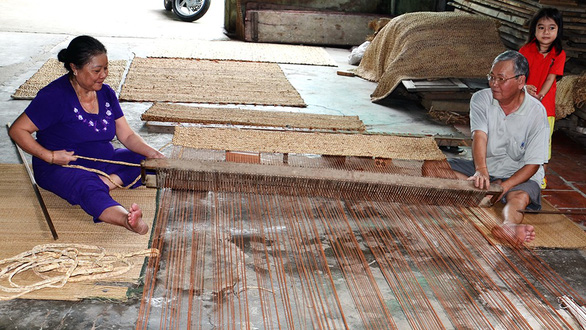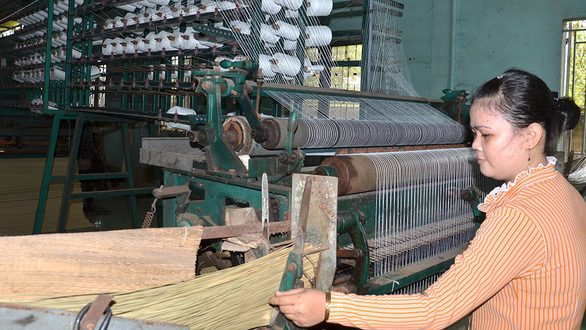A Vietnamese man has been keeping his family business of making traditional mats, which was first started some three decades ago, alive and even exporting the products to the global market.
Tran Duc Tuan has not only rejuvenated one of Vietnam’s traditional crafts thought to have faded with time, but also made a fortune from mat weaving.
Bad luck
Tuan was the son of a traditional mat maker in the northern province of Ninh Binh, who had run a successful business selling the products to the former Soviet Union and other Eastern Europe markets before the 1990s.
The family continued the mat exports when they relocated to the Mekong Delta province of Tien Giang in southern Vietnam.
But Tuan’s family business began to tail off, downsizing to a household scale in the wake of the dissolution of the Soviet Union in December 1991, he told Tuoi Tre (Youth) newspaper.
Profits from the small-scale production were only enough to make ends meet, he added.
The business only started to recover in 1995, when an acquaintance of the family asked Tuan’s father to weave edge mats as per their orders and ship the products to South Korea.
Tuan said his father had to travel to neighboring Vinh Long Province to buy green reeds, the main material to weave a Vietnamese traditional mat, in order to complete the first order of 3,000 mats to be shipped to South Korea.
The customer was utterly satisfied with those 3,000 mats, woven from Vinh Long quality reeds, and the first order just paved the way for more to come, Tuan recalled happily.
Everything had been good until 2001, when another bad luck once again hit his family - their warehouse was destroyed in a mysterious fire whose cause police failed to find out.
“All materials and complete products were burned to ashes,” Tuan said.
Let down by time-to-time difficulties, his father gave up mat weaving for gardening, while Tuan worked as a driver to scrape a living.
|
|
| A female worker operates an automatic mat-weaving machine. Photo: H. Phuong / Tuoi Tre |
Beginning again
The instability of working as a driver eventually drove Tuan back to his family’s traditional business a few years later, even though it means he had to start from scratch.
Tuan began recovering the mat making business by buying three used Japanese mat-weaving machines and renovated them for production, first targeting only the domestic market.
As he was successful in gaining customer satisfaction, he scaled up his mat-weaving workshop to a private company, Vinh Thuan Co.
Tuan also invested more in modern equipment and technology to increase productivity and quality for the company.
The business owner embraced automation, first replacing human labor with semi-automatic machines, and later having 200 automatic machines in charge of all the production.
Acknowledging that one of the biggest challenges a mat maker faces is the lack of materials, in 2008, Tuan encouraged farmers in Cang Long District of Tra Vinh Province to grow reeds using his company’s cultivation method.
The company also provided the farmers with seeds and technical guidelines, and was committed to buying all their yields.
Vinh Thuan Co. now sources more than 1,000 metric tons of materials from three Mekong Delta provinces, Tra Vinh, Dong Thap, and Ca Mau, on an annual basis.
The company exports around 100,000 mats of different kinds to several countries, with South Korea being its main market, generating some US$2 million a year.
In addition, Tuan’s company supplies more than two million of its traditional mats to a number of military and police units nationwide, and 300,000 products to workers at industrial zones across Vietnam every year.
Vinh Thuan provides the Lao defense ministry with 400,000 mats per year.
To ensure long-term development for the Vietnamese traditional mat weaving, Tuan places importance in training local employees by teaching them skills for free.
“We are trying our best to create favorable conditions for locals to follow the job and make a living,” Tuan said.
Like us on Facebook or follow us on Twitter to get the latest news about Vietnam!



















































